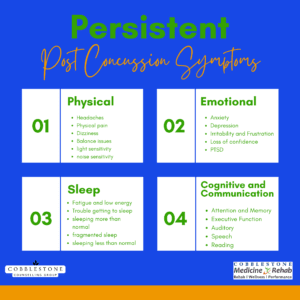Recognition of the signs and symptoms is crucial when diagnosing a concussion. Symptoms can vary from physical dysfunctions to mental disturbances, emotional and sleep changes. These symptoms will vary from patient to patient. It is essential to be assessed by an experienced Cobblestone-trained health professional.
 Signs May include:
Signs May include:
Dazed, confusion, reduced memory, “unsureness”, clumsy, slowly answers questions, possible loss of consciousness, and slower behaviour.
Symptoms May include:
Physical:
Headache
Nausea
Vomiting
Blurred or double vision
Seeing stars or lights
Balance problems
Dizziness
Sensitivity to light or noise
Tinnitus
Vertigo
Behavioural/ Emotional:
Drowsiness
Fatigue/lethargy
Irritability
Depression
Anxiety
Sleeping more than usual
Difficulty falling asleep
Cognitive:
Feeling “slowed down”
Feeling “in a fog” or “dazed”
Difficulty concentrating
Difficulty remembering
http://https://youtu.be/rYWIy-Td2Q4
Red Flags – Get Medical Help ASAP!
1. Progressive worsening headache
2. Worsening vomiting and nausea
3. Unequal dilated pupils
4. Decline in mental status
5. Deteriorated sleep habits
Injured athletes can exhibit many or just a few of the signs and/or symptoms of concussion. However, if an athlete exhibits any signs or symptoms of concussion, the responsibility is simple: remove them from participation. “When in doubt sit them out.” It is important to notify a parent or guardian when an athlete is thought to have a concussion. Any athlete with a concussion must be seen by an appropriate health care provider before returning to practice (including dryland/weight lifting) or competition.
“Having even just one sign or symptom may be a sign that the athlete has had a concussion and should be looked at by a experienced health professional dealing with head injuries”
 Signs May include:
Signs May include:
